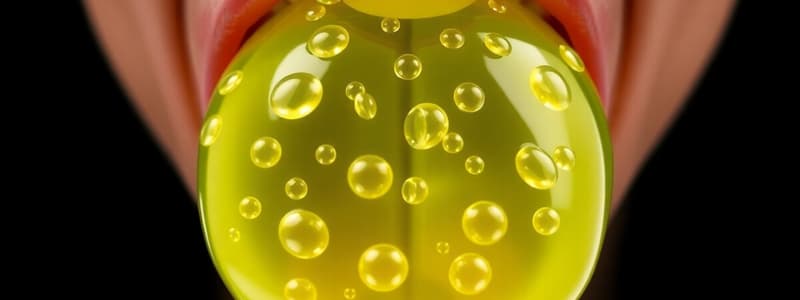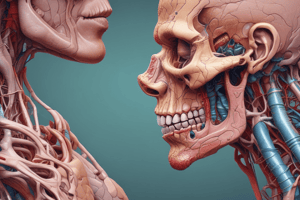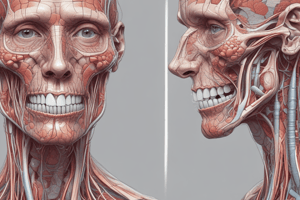Podcast
Questions and Answers
What active process occurs in the ducts as primary saliva is modified?
What active process occurs in the ducts as primary saliva is modified?
- Chloride secretion
- Sodium absorption (correct)
- Bicarbonate absorption
- Potassium absorption
How does the composition of saliva change as it modifies in the ducts?
How does the composition of saliva change as it modifies in the ducts?
- It loses all electrolytes.
- It becomes more acidic.
- It remains identical to plasma.
- It becomes slightly alkaline. (correct)
What drives the passive movement of electrolytes during saliva modification?
What drives the passive movement of electrolytes during saliva modification?
- Temperature changes
- A pressure gradient
- Enzymatic reactions
- An ionic imbalance (correct)
Which of the following ions is actively secreted to balance the charge in saliva?
Which of the following ions is actively secreted to balance the charge in saliva?
What is the primary source of saliva before modification occurs in the ducts?
What is the primary source of saliva before modification occurs in the ducts?
What electrical negativity is created in the salivary ducts due to excess Na+ reabsorption over K+ secretion?
What electrical negativity is created in the salivary ducts due to excess Na+ reabsorption over K+ secretion?
Which type of reflex is triggered by the presence of food in the mouth?
Which type of reflex is triggered by the presence of food in the mouth?
What function does the glossopharyngeal nerve (cranial nerve IX) serve?
What function does the glossopharyngeal nerve (cranial nerve IX) serve?
What is the role of salivary amylase in saliva?
What is the role of salivary amylase in saliva?
Which type of salivary reflex occurs without oral stimulation?
Which type of salivary reflex occurs without oral stimulation?
Which cranial nerve is responsible for taste sensation from the posterior one-third of the tongue?
Which cranial nerve is responsible for taste sensation from the posterior one-third of the tongue?
What happens to chloride ions in the salivary ducts due to electrical negativity?
What happens to chloride ions in the salivary ducts due to electrical negativity?
Which glands are stimulated by the facial nerve?
Which glands are stimulated by the facial nerve?
What is the primary role of the parasympathetic nervous system in salivary gland activity?
What is the primary role of the parasympathetic nervous system in salivary gland activity?
Which condition is associated with increased saliva production?
Which condition is associated with increased saliva production?
Which of the following glands secretes Hydrochloric acid?
Which of the following glands secretes Hydrochloric acid?
What is the dominant role of the parasympathetic nervous system in the context of salivary secretion?
What is the dominant role of the parasympathetic nervous system in the context of salivary secretion?
Pepsinogen released by gastric glands is important for which digestive process?
Pepsinogen released by gastric glands is important for which digestive process?
What does the sympathetic nervous system primarily produce in terms of salivary secretion?
What does the sympathetic nervous system primarily produce in terms of salivary secretion?
Where is the gastric mucus located primarily?
Where is the gastric mucus located primarily?
Which component is essential for the absorption of Vitamin B12?
Which component is essential for the absorption of Vitamin B12?
The primary function of mucus in gastric secretion is to:
The primary function of mucus in gastric secretion is to:
Chopping a pencil, which is a rough object, has what effect on saliva production?
Chopping a pencil, which is a rough object, has what effect on saliva production?
What do parietal cells primarily secrete?
What do parietal cells primarily secrete?
Which cells are primarily responsible for secreting pepsinogen?
Which cells are primarily responsible for secreting pepsinogen?
What is the main purpose of mucus secreted by mucous neck cells?
What is the main purpose of mucus secreted by mucous neck cells?
What two components are required for the formation of hydrochloric acid (HCl) in the canaliculi?
What two components are required for the formation of hydrochloric acid (HCl) in the canaliculi?
Which mechanism is used to transport hydrogen ions (H⁺) into the canaliculi?
Which mechanism is used to transport hydrogen ions (H⁺) into the canaliculi?
What happens when carbon dioxide (CO₂) combines with water (H₂O) in the presence of carbonic anhydrase?
What happens when carbon dioxide (CO₂) combines with water (H₂O) in the presence of carbonic anhydrase?
What is the function of the microvilli lining the canaliculi?
What is the function of the microvilli lining the canaliculi?
What is the role of bicarbonate in the gastric system?
What is the role of bicarbonate in the gastric system?
What is the role of pepsin in the stomach?
What is the role of pepsin in the stomach?
Which cells are responsible for secreting intrinsic factor?
Which cells are responsible for secreting intrinsic factor?
What condition results from a deficiency of vitamin B12?
What condition results from a deficiency of vitamin B12?
How does the destruction of parietal cells affect digestion?
How does the destruction of parietal cells affect digestion?
What effect does chronic gastritis have on the body’s ability to absorb vitamin B12?
What effect does chronic gastritis have on the body’s ability to absorb vitamin B12?
G cells in the pyloric glands are responsible for secreting which hormone?
G cells in the pyloric glands are responsible for secreting which hormone?
What is the main function of the thick mucus secreted by surface mucous cells?
What is the main function of the thick mucus secreted by surface mucous cells?
What is a consequence of achlorhydria?
What is a consequence of achlorhydria?
What happens to folic acid levels when vitamin B12 is deficient?
What happens to folic acid levels when vitamin B12 is deficient?
The primary alkalinity of the mucus produced in the pyloric glands serves to:
The primary alkalinity of the mucus produced in the pyloric glands serves to:
Which gland produces the majority of saliva in the human mouth?
Which gland produces the majority of saliva in the human mouth?
What is the primary function of salivary alpha amylase?
What is the primary function of salivary alpha amylase?
Which component of saliva plays a role in lubricating food in the mouth?
Which component of saliva plays a role in lubricating food in the mouth?
What is the pH range of saliva?
What is the pH range of saliva?
Which of the following is NOT a major component of saliva?
Which of the following is NOT a major component of saliva?
Which electrolytes are found in saliva in higher concentrations compared to plasma?
Which electrolytes are found in saliva in higher concentrations compared to plasma?
What role do proline-rich proteins play in saliva?
What role do proline-rich proteins play in saliva?
The buccal glands primarily secrete which type of saliva?
The buccal glands primarily secrete which type of saliva?
Which GIT hormone is primarily responsible for stimulating the secretion of gastric juice?
Which GIT hormone is primarily responsible for stimulating the secretion of gastric juice?
Which factor contributes to the hypotonic nature of saliva?
Which factor contributes to the hypotonic nature of saliva?
Which gland is mainly responsible for producing the enzyme amylase in saliva?
Which gland is mainly responsible for producing the enzyme amylase in saliva?
Which type of secretion do submandibular and sublingual glands mainly produce?
Which type of secretion do submandibular and sublingual glands mainly produce?
What is the primary reason for the antibacterial properties of saliva?
What is the primary reason for the antibacterial properties of saliva?
What is the daily secretion range of saliva in milliliters?
What is the daily secretion range of saliva in milliliters?
Flashcards
Primary Saliva
Primary Saliva
The initial saliva produced by the acini, the secretory units of salivary glands, is similar in composition to blood plasma.
Acini
Acini
These are the tiny, grape-like structures within salivary glands that produce the initial saliva.
Sodium Absorption
Sodium Absorption
As primary saliva travels through the salivary ducts, sodium ions are actively absorbed into the duct cells, making the saliva less like plasma.
Potassium Secretion
Potassium Secretion
Signup and view all the flashcards
Bicarbonate Secretion
Bicarbonate Secretion
Signup and view all the flashcards
What starts carbohydrate digestion?
What starts carbohydrate digestion?
Signup and view all the flashcards
What is one key function of saliva?
What is one key function of saliva?
Signup and view all the flashcards
How does saliva maintain pH balance?
How does saliva maintain pH balance?
Signup and view all the flashcards
What allows you to sing and talk?
What allows you to sing and talk?
Signup and view all the flashcards
What enzyme breaks down carbs in your mouth?
What enzyme breaks down carbs in your mouth?
Signup and view all the flashcards
What is a simple salivary reflex?
What is a simple salivary reflex?
Signup and view all the flashcards
What is an acquired salivary reflex?
What is an acquired salivary reflex?
Signup and view all the flashcards
What is the role of the Glossopharyngeal nerve (IX) in salivation?
What is the role of the Glossopharyngeal nerve (IX) in salivation?
Signup and view all the flashcards
Salivary glands control
Salivary glands control
Signup and view all the flashcards
What inhibits saliva?
What inhibits saliva?
Signup and view all the flashcards
Sympathetic and parasympathetic role in saliva
Sympathetic and parasympathetic role in saliva
Signup and view all the flashcards
Parasympathetic vs. Sympathetic saliva
Parasympathetic vs. Sympathetic saliva
Signup and view all the flashcards
Gastric glands
Gastric glands
Signup and view all the flashcards
What does HCl do?
What does HCl do?
Signup and view all the flashcards
What is Pepsinogen?
What is Pepsinogen?
Signup and view all the flashcards
What is Intrinsic Factor?
What is Intrinsic Factor?
Signup and view all the flashcards
Why is mucus in the stomach?
Why is mucus in the stomach?
Signup and view all the flashcards
What does Gastrin do?
What does Gastrin do?
Signup and view all the flashcards
Parietal Cell
Parietal Cell
Signup and view all the flashcards
Intrinsic Factor
Intrinsic Factor
Signup and view all the flashcards
Hydrochloric Acid (HCl)
Hydrochloric Acid (HCl)
Signup and view all the flashcards
Peptic Cell
Peptic Cell
Signup and view all the flashcards
Pepsinogen
Pepsinogen
Signup and view all the flashcards
Mucous Neck Cells
Mucous Neck Cells
Signup and view all the flashcards
Canaliculi
Canaliculi
Signup and view all the flashcards
Microvilli
Microvilli
Signup and view all the flashcards
Pepsinogen Activation
Pepsinogen Activation
Signup and view all the flashcards
Intrinsic Factor Role
Intrinsic Factor Role
Signup and view all the flashcards
Vitamin B12 Deficiency
Vitamin B12 Deficiency
Signup and view all the flashcards
Parietal Cell Destruction
Parietal Cell Destruction
Signup and view all the flashcards
Pyloric Gland Function
Pyloric Gland Function
Signup and view all the flashcards
Gastrin's Role
Gastrin's Role
Signup and view all the flashcards
Stomach Mucus Barrier
Stomach Mucus Barrier
Signup and view all the flashcards
Protein's Effect on Gastrin
Protein's Effect on Gastrin
Signup and view all the flashcards
ECL Cells and Histamine
ECL Cells and Histamine
Signup and view all the flashcards
Pepsin and Protein Breakdown
Pepsin and Protein Breakdown
Signup and view all the flashcards
What is Saliva?
What is Saliva?
Signup and view all the flashcards
What is the Parotid Gland?
What is the Parotid Gland?
Signup and view all the flashcards
What are the Submandibular & Sublingual glands?
What are the Submandibular & Sublingual glands?
Signup and view all the flashcards
What is Salivary Amylase?
What is Salivary Amylase?
Signup and view all the flashcards
What are the roles of Saliva?
What are the roles of Saliva?
Signup and view all the flashcards
How is Saliva Modified?
How is Saliva Modified?
Signup and view all the flashcards
What is the Salivary Secretion Process?
What is the Salivary Secretion Process?
Signup and view all the flashcards
How is Salivation Regulated?
How is Salivation Regulated?
Signup and view all the flashcards
What Hormones Regulate Gastric Juice Production?
What Hormones Regulate Gastric Juice Production?
Signup and view all the flashcards
What is Gastric Juice?
What is Gastric Juice?
Signup and view all the flashcards
Why is Hydrochloric Acid Important?
Why is Hydrochloric Acid Important?
Signup and view all the flashcards
What is the Role of Gastrin?
What is the Role of Gastrin?
Signup and view all the flashcards
What is the Role of Secretin?
What is the Role of Secretin?
Signup and view all the flashcards
Study Notes
Saliva and Gastric Secretions
- Saliva is a mixture of secretions produced by three glands: sublingual, submandibular, and parotid.
- Daily saliva secretion ranges from 800 to 1500 ml.
- Saliva pH is between 6-7.
- Saliva is alkaline in nature.
- Parotid glands are the largest
- Buccal glands secrete mucus only.
- Salivary glands are controlled primarily by the parasympathetic nervous system.
- Salivary secretion is a two-stage process. The first stage (acini) produces a primary secretion similar in composition to plasma which contains ptyalin, mucus, and extracellular fluid. Second stage (ducts) modifies saliva, through processes of sodium absorption and potassium secretion, thus becoming less similar to plasma and slightly alkaline.
- Saliva components include water (90%), electrolytes, salivary alpha amylase (ptyalin), lingual lipase, mucin, IgA antibody, antibacterial substances, lysosome, and prolinrich proteins.
- Saliva functions include taste, oral hygiene, protection, digestion, mastication, swallowing, buffering, singing, and speech.
- Two types of salivary reflexes include simple (unconditioned) and acquired (conditioned).
- Unconditioned reflex is triggered by oral stimulation by the presence of food.
- Conditioned reflex occurs without oral stimulation (thinking, seeing, smelling, or hearing of pleasant food).
- Salivation factors include sour taste (acids), smooth objects, rough objects, taste/smell of food, and presence of food.
- Salivation is inhibited by some factors and excited by others.
Gastric Secretions
- Stomach mucosa has two types of tubular glands: oxyntic (gastric) glands and pyloric glands.
- Oxyntic (gastric) glands are located on the inside surfaces of the body and fundus (80%).
- Oxyntic glands secrete hydrochloric acid, pepsinogen, intrinsic factor, and mucus.
- Pyloric glands are located in the antral portion (20%).
- Pyloric glands secrete mucus for protection and gastrin.
- Oxyntic gland is composed of parietal cells, peptic cells (chief cells), and mucous neck cells.
- Parietal cells secrete hydrochloric acid and intrinsic factor.
- Peptic cells (chief cells) secrete pepsinogen.
- Mucous neck cells secrete mucus.
- Mucus is rich in bicarbonate to prevent acid damage.
- HCl formation involves combining hydrogen and chloride ions. Hydrogen ions are transported into the canaliculi via the H+/K+ ATP pump (exchanging H+ for K+). Hydroxyl ions combine with CO2 to form bicarbonate (HCO3-), which is released into the interstitial space via chloride-bicarbonate exchange.
- Gastric secretion has three phases: cephalic, gastric, and intestinal.
- Cephalic phase occurs before food enters, stimulated by sight, smell, thought, or taste of food.
- Gastric phase is triggered by food entering the stomach, stimulated by distension, local reflexes, the vagus nerves, and gastrin.
- Intestinal phase inhibits gastric secretion by reverse enterogastric reflex and hormones like secretin, gastric inhibitory peptide, and cholecystokinin. These hormones act in response to pH<2 (or presence of lipids) in small intestine.
- Gastrin is a peptide hormone secreted by G cells in the pyloric glands. Gastrin stimulates ECL cells to release histamine which further increases HCl production and secretion.
- Enterochromaffin-like (ECL) cells are stimulated by gastrin to secrete histamine which is required for HCL production.
Studying That Suits You
Use AI to generate personalized quizzes and flashcards to suit your learning preferences.




